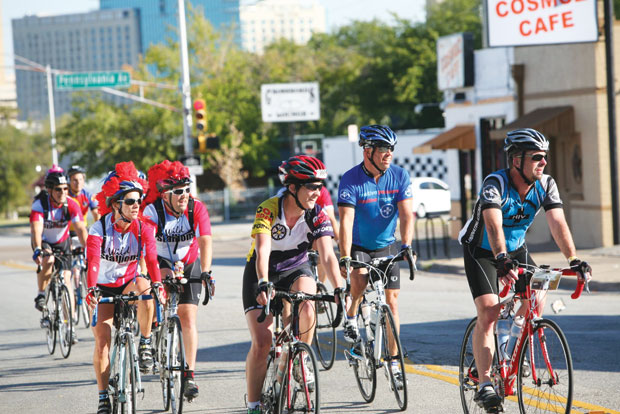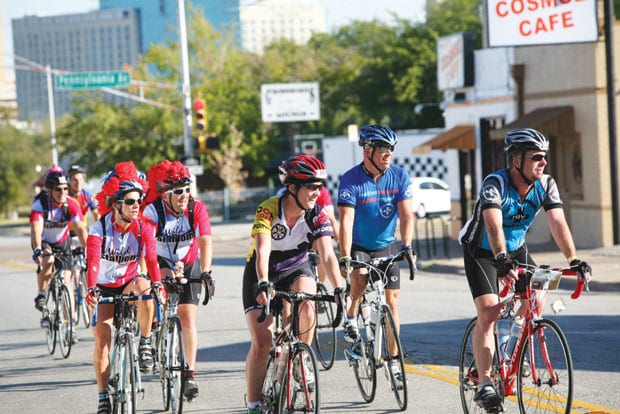Decreasing returns prompted the LSRFA board to end the event, but its members maintain the fight against HIV/AIDS isn’t over

LAST RIDE | Rides such as the one pictured above, will no longer be held, the LSRFA board recently decided. Beneficiaries hope other donors will fill the financial hole. (File photo)
An email sent to previous participants and sponsors of the Lone Star Ride Fighting AIDS from board chair Jacque Borel was received across the community with sadness.
Lone Star Ride was a fundraiser for three AIDS agencies — AIDS Services of Dallas, Resource Center and AIDS Outreach Center. For the past two years, however, the ride has fallen short of its goal and this year returned only $28,000 to each agency.
Borel said the ride had bad luck with weather over the past three years and had a dwindling volunteer base. Sponsorships were harder to get.
“There didn’t seem to be the same interest as there once was,” he said. “And the returns weren’t meeting expectations.”
He said the board was concerned with being a good steward of people’s money, so it voted to suspend the ride.
“As a result of this analysis by the Board, the Board has reached the conclusion that Lone Star Ride Fighting AIDS is no longer an effective vehicle to raise monies for our beneficiaries,” Borel wrote in a letter to participants and sponsors.
Closing the ride is a loss being felt by community members who contributed in a number of ways.
Every year, Roger Lippert photographed the ride.
“I was very sad to hear it’s ending but so thankful for all the wonderful friends I made and all of the great memories,” he said.
He said getting together for the ride each year was like a family reunion.
The loss also was felt among those supplying services to the ride.
“Ambient Stage Lighting was honored to be a part of the ride every year,” Ambient Vice President Sylvia Salazar King wrote on Facebook. “It’s sad to know it will not be anymore. We made great friends and great memories. We will miss all of them.”
The beneficiaries will have to find ways to make up for the lost funding.
“We will certainly regret the loss of the event in our community and the loss of funding to serve our HIV-positive clients,” Resource Center CEO Cece Cox said.
Her agency was one of the beneficiaries of Lone Star Ride along with AIDS Services Dallas and AIDS Outreach Center.
Cox said Resource Center’s budget is planned for the year, and the loss of the ride creates a hole. She hoped Lone Star riders, crew and sponsors as well as other community members would step in and help fill the gap in funding.
Janie Bush was the director of the Lone Star Ride for its first five years.
“This makes me very sad,” he said.
Bush was pledge drive office manager for the Tanqueray Texas AIDS Ride that predated the Lone Star Ride and was hired to create the new Lone Star Ride.
The Tanqueray ride, a four-day bike ride from Houston to Dallas, was expensive to produce and brought little return to its beneficiary agencies.
She said the heart and soul of the Tanqueray ride was what she tried to incorporate in the Lone Star Ride.
“The event was supportive, encouraging and uplifting,” she said. “The camaraderie of participating in the fundraising and training struggles. Watching someone who was told years before that they had a death sentence with HIV now succeeding. Watching someone who’s overweight make it to each pit stop. There was an incredible sense of community.”
While the Tanqueray ride failed to raise money, Lone Star Ride succeeded. Since 2000, the organization donated more than $2 million to its three beneficiaries.
Expenses for the Lone Star Ride were very low. A ride director was the only salaried staff, and that cost was covered by a grant. Volunteers did the bulk of the work rather than paid staff with the Tanqueray ride. Goods and services were donated.
AIDS Services of Dallas used its connections with restaurants to have snacks for pit stops and meals donated. One Lone Star Ride board member worked for Starbucks, and he arranged for his company to provide the coffee. Trucks that hauled equipment to the pit stops and campsites were donated for the weekend rather than rented. Rider and crew shirts were donated.
Bush said she hopes Lone Star riders continue to contribute to the beneficiaries. She suggested riders and crew might continue to fundraise among their friends to contribute to the agencies or help make their other fundraising events bigger.
“I think rather than reinvent the wheel, pick something with a good track record,” Bush said. “Put your energy into LifeWalk or Black Tie Dinner or No Tie Dinner or volunteer for one of the organizations.”
This article appeared in the Dallas Voice print edition January 24, 2014.

